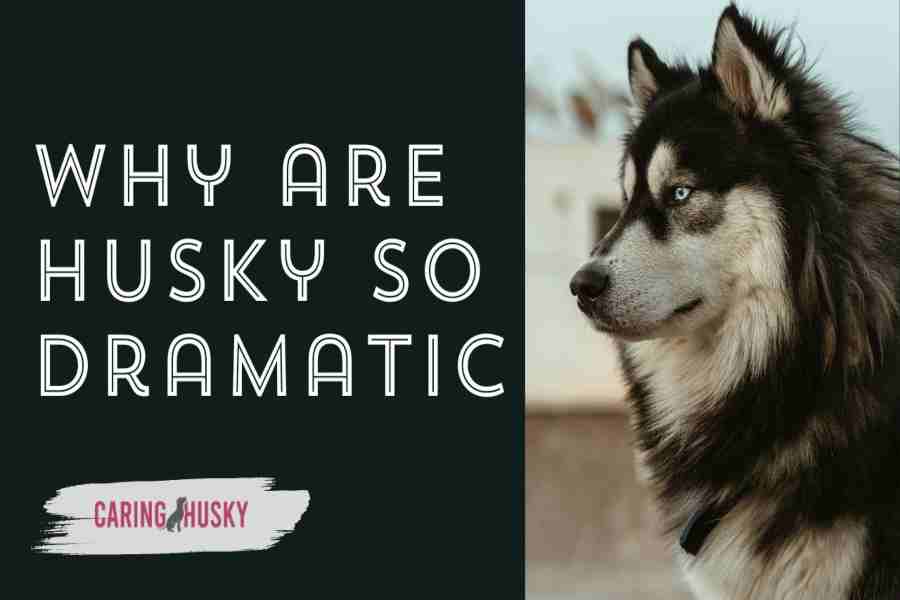Huskies, with their striking appearance and enigmatic personalities, have long captured the hearts of dog enthusiasts worldwide. Yet, beneath their alluring exterior lies a dramatic streak that many Husky owners can readily attest to. These majestic canines are known for their vocal howls, attention-seeking antics, and stubborn independence, often leaving their human companions wondering, “Why are Huskies so dramatic?” This article will delve into the fascinating world of Husky behavior, exploring the reasons behind their dramatic tendencies, the environmental factors influencing them, and strategies to manage and appreciate their unique charm. So, if you’ve ever been perplexed by your Husky’s flair for the dramatic, read on to uncover the secrets behind their captivating personality.
Why Are Husky So Dramatic?
Huskies are often perceived as dramatic due to their vocal and expressive nature. Their dramatic howling and penchant for seeking attention are rooted in their history as sled dogs, where communication and teamwork were essential. Additionally, Huskies thrive in colder climates, and their dramatic behavior can be a response to environmental factors such as temperature. Proper training, exercise, and understanding of their needs can help manage their dramatic tendencies and allow you to appreciate their unique and captivating personalities.
Genetic Factors Contributing To Husky Drama
Genetic factors play a substantial role in shaping Husky drama, influencing their behavior and personality traits. Here are some genetic factors contributing to Husky drama:
- Ancestral Traits: Huskies are descendants of sled dogs bred by the Chukchi people in Siberia. These dogs were selected for their endurance, stamina, and ability to work in challenging conditions. Many dramatic behaviors seen in Huskies today, such as howling, vocalization, and seeking attention, may have been advantageous traits for their working ancestors. These characteristics have been passed down through generations.
- Independence: Huskies are known for their independent nature, often linked to their genetic heritage. This independence can manifest as stubbornness and a desire to do things their way. While this trait can make them more challenging to train, it’s also a genetic factor contributing to their unique personalities and occasional dramatic responses when they don’t get their way.
- Communication Style: Huskies have a distinct way of communicating, including vocalizations like howling and “talking.” These communication methods have genetic roots and may have been developed to convey messages over long distances in their native Siberian environment. While these vocalizations can be dramatic to some, they are deeply ingrained genetic behaviors.
- High Energy Levels: Genetic factors also play a role in Huskies’ high energy levels. These dogs were bred for endurance and hard work, so their genes are geared towards physical activity. When their need for exercise and mental stimulation isn’t met, it can lead to dramatic behaviors as they try to release excess energy.
- Temperament and Personality: Certain temperamental traits, such as a strong prey drive, curiosity, and an affinity for play, can be influenced by genetics. These traits can lead to dramatic responses when encountering new situations or stimuli that trigger their innate instincts.
While genetics play a significant role in shaping Husky behavior, it’s important to remember that individual variation exists within the breed. Not all Huskies will exhibit the same level of drama, and genetic and environmental factors can influence their behavior. Understanding these genetic predispositions can help Husky owners appreciate their unique breed traits and work with them to manage and enjoy their sometimes dramatic but always captivating canine companions.
Environmental Factors Influencing Husky Drama
Environmental factors exert a substantial influence on Husky drama, shaping their behavior and reactions in various ways:
- Climate and Temperature: Huskies are initially bred for the harsh climates of Siberia, and their thick double coats are well-suited for cold weather. When Huskies are kept in warmer environments, they may exhibit dramatic behaviors in response to the discomfort caused by high temperatures. This can include excessive panting, seeking shade, or even refusing to engage in physical activities due to the heat. Their dramatic reaction is a natural response to their struggle to regulate their body temperature.
- Socialization and Upbringing: Early socialization is essential for Huskies to develop well-adjusted and confident personalities. If they are not adequately socialized during their puppyhood, they may react dramatically when encountering new people, animals, or environments. This can manifest as fear-based behaviors, excessive barking, or even dramatic attempts to escape unfamiliar situations.
- Exercise and Mental Stimulation: Huskies are known for their high energy levels and strong work ethic. Without sufficient exercise and mental stimulation, they can become restless and bored. In such cases, they may resort to dramatic behaviors to release pent-up energy. This can include actions like digging, chewing, or howling excessively. Regular exercise and engaging activities are essential to satisfy Huskies mentally and physically.
- Living Conditions: The living conditions provided to Huskies can significantly impact their behavior. Huskies thrive in spacious environments where they have room to explore and play. In cramped living spaces or when subjected to prolonged confinement, they may exhibit dramatic behaviors as a response to frustration or a desire for more freedom. Destructive actions like chewing furniture or incessant pacing can result from such situations
- Routine and Structure: Huskies thrive on routine and structure daily. They feel most comfortable when they can predict their daily activities and surroundings. Sudden changes or disruptions in their routines can lead to dramatic reactions as they rely on stability and predictability. Maintaining a consistent routine can help alleviate some of their dramatic tendencies.
In conclusion, environmental factors significantly contribute to Husky drama. To manage and mitigate these dramatic behaviors, Husky owners must consider their pets’ needs, including climate, socialization, exercise, living conditions, and routine. By providing a suitable environment and meeting their physical and mental requirements, Husky owners can help their dogs lead happier, healthier, and less dramatic lives.
The Drama Of Huskies: Common Behaviors
Huskies, with their striking appearance and captivating personalities, often exhibit a range of dramatic behaviors that set them apart from other dog breeds. These behaviors, while endearing to some, can be perplexing to others. Here, we delve into the drama of Huskies and explore some of the most common behaviors that make them stand out:
Vocalization and Howling: One of the most iconic traits of Huskies is their melodious howling. While howling is a form of communication for all dogs, Huskies take it to another level. They howl to express excitement, frustration, or even loneliness. Their hauntingly beautiful howls can be dramatic, especially when they join in a chorus of sirens or react to music.
Attention-Seeking Behavior: Huskies are social dogs that thrive on human interaction. They may resort to dramatic antics to regain your attention when ignored or left out. This can include pawing at you, “talking” in a series of expressive vocalizations, or even pretending to be injured, all in a bid to capture your focus.
Dramatic Body Language: Huskies are masters of dramatic body language. Their expressive faces, with piercing blue eyes, often convey a wide range of emotions. When excited or agitated, they may engage in theatrical displays, such as exaggerated tail wagging, hopping around, or dramatically flopping onto their backs, demanding belly rubs.
Stubbornness and Independence: Huskies are renowned for their stubborn streak and independence. When they decide not to do something, their resistance can be dramatic. This might involve sitting down and refusing to budge, vocalizing their disapproval, or even turning their heads away in defiance.
Escape Attempts: With a natural wanderlust and a desire to explore, Huskies can be masters of dramatic escape attempts. When confined to a yard or leash, they may dig frantically under fences, scale obstacles with impressive agility, or squeeze through surprisingly tight spaces, all in pursuit of their innate need for adventure.
Playful Dramatics: Huskies have an exuberant playfulness that can lead to dramatic play behaviors. During playtime, they may engage in mock battles with other dogs, execute dramatic leaps and spins, or embark on wild, high-speed zoomies that involve sprinting around the yard theatrically.
Selective Hearing: Huskies can display what appears to be selective hearing, a behavior that can be interpreted as a form of dramatic disobedience. They may ignore commands when they’re not in the mood to comply, seemingly feigning indifference to your requests.
Understanding these common dramatic behaviors is essential for Husky owners. While these antics may seem amusing or frustrating, they often serve as Huskies’ ways of communicating their needs or expressing their unique personalities. These behaviors can be managed and redirected with proper training, exercise, mental stimulation, and, most importantly, a deep appreciation for the delightful drama Huskies bring into our lives.
Bottom Line
In conclusion, Huskies are a dramatic breed, but their unique behaviors stem from genetics, environmental factors, and their need for physical and mental stimulation. Understanding the reasons behind their drama and employing practical training and management strategies can help Husky owners build a strong bond with their furry companions and appreciate the captivating world of these majestic dogs. Embrace the drama, embrace the charm, and revel in life’s adventures with a Husky by your side.
FAQ’s
Which dog breed is the most dramatic?
The Siberian Husky is often considered one of the most dramatic dog breeds due to its vocal howling, attention-seeking behavior, and expressive body language. While many dogs can be dramatic in their ways, Huskies’ unique and theatrical tendencies set them apart.
Which is the friendliest dog?
The Labrador Retriever is widely recognized as one of the friendliest dog breeds. Their pleasant and friendly nature and love for people and other animals make them a top choice for families and individuals seeking a friendly and outgoing canine companion.
Which dog breed is the drama queen?
The Siberian Husky is often playfully called the “drama queen” among dog breeds due to their theatrical and expressive behaviors. They are known for their vocal howling, attention-seeking antics, and dramatic body language, making them stand out in the world of canine drama.







Leave a Reply